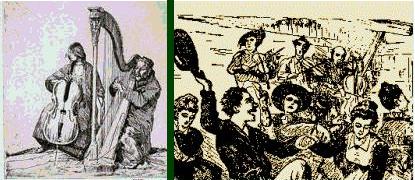Cellist Hilton commented: If you could magically play with the technique of a professional, would you? Why or why not?
Interesting question. I'm going to take a shot at answering.
No. At least not often or much. Consider the typical orchestra parts. The cello parts are usually far easier than I would think the composer would expect the players to be able to play. Yes, some composers make it a struggle, but normally players in an ensemble have other things on their mind than using their technique. Listening, balancing, matching, following, emphasizing, backing off, energy, restraint, artistry... The notes themselves are relatively easy.
Perhaps a good, albeit imperfect anology is: technique is to music as vocabulary is to story-telling. You need a minimum vocabulary to tell a story. To a point, a fuller and more accurate choice of words can make a more vivid and interesting story. But long, complex, high-falutin' words for the sake of showing off one's vocabulary doesn't help the story. And if the story is told by multiple story-tellers in ensemble, but one teller's words don't fit, it degrades the story.
Certainly Mark Twain had an educatated man's vocabulary, but should he use all that educated vocabulary for the voices in the story? Aren't there other elements to a story than just vocabulary. The relationships of words to other words. Images the words evoke. Tension and release. Main characters and supporting characters.
In practice, too many notes in the cello range sounds sounds too cluttered and hurried.
Rushad Eggleton, a classically-trained cello prodigy, said in Fiddler Magazine: "I began working out tunes like 'Bill Cheatum' and 'Salt Creek,' but at first I started out playing them in a way that felt totally unnatural. I tried playing them using classical cello technique, which was difficult. It took me a long time to realize that people who play folk and vernacular music didn't play their instruments in a way that's physically difficult, like classically trained musicians do. They play their instrument in an organic way. Fiddlers tend to play in first position, for example. So if I was going to play this music on cello, I was going to have to play it in the simplest way possible. I experimented with different ways of holding the bow, and for a while I tried playing without the end peg, but eventually I stopped thinking about technique altogether. "I stopped playing the tunes in the upper octaves, the same range the fiddle is tuned to, and started playing them in first position, in the lower ranges I call the heart of cello land. In bluegrass music, not every instrument plays the tune the same way -- the banjo does it a bit differently from the mandolin and so on -- and I realized I could change things a bit, too, so they fit the cello. I could put some passages down an octave for example, and make the tone really bluesy and growly and take advantage of what the cello has to offer. I've really gotten into the low, grumbliness of the instrument."

Old World or New, Sacred or Profane
Subscribe to:
Post Comments (Atom)
3 comments:
Great post! It's given me a lot to think about. I want my response to do this justice, so I'm going to think about it tonight and comment tomorrow.
Terry-
I've been enjoying your blog.Keep it up! Meant to write sooner but got busy. Also wanted to thank you again for the harmony parts to Red Wing and Miss. Sawyer. I got together w/ my fiddle friend last weekend and tried them out with her. Very fun.
YellowDog
No time to post today so I shall do it sometime this weekend. Happy Thanksgiving!
Post a Comment